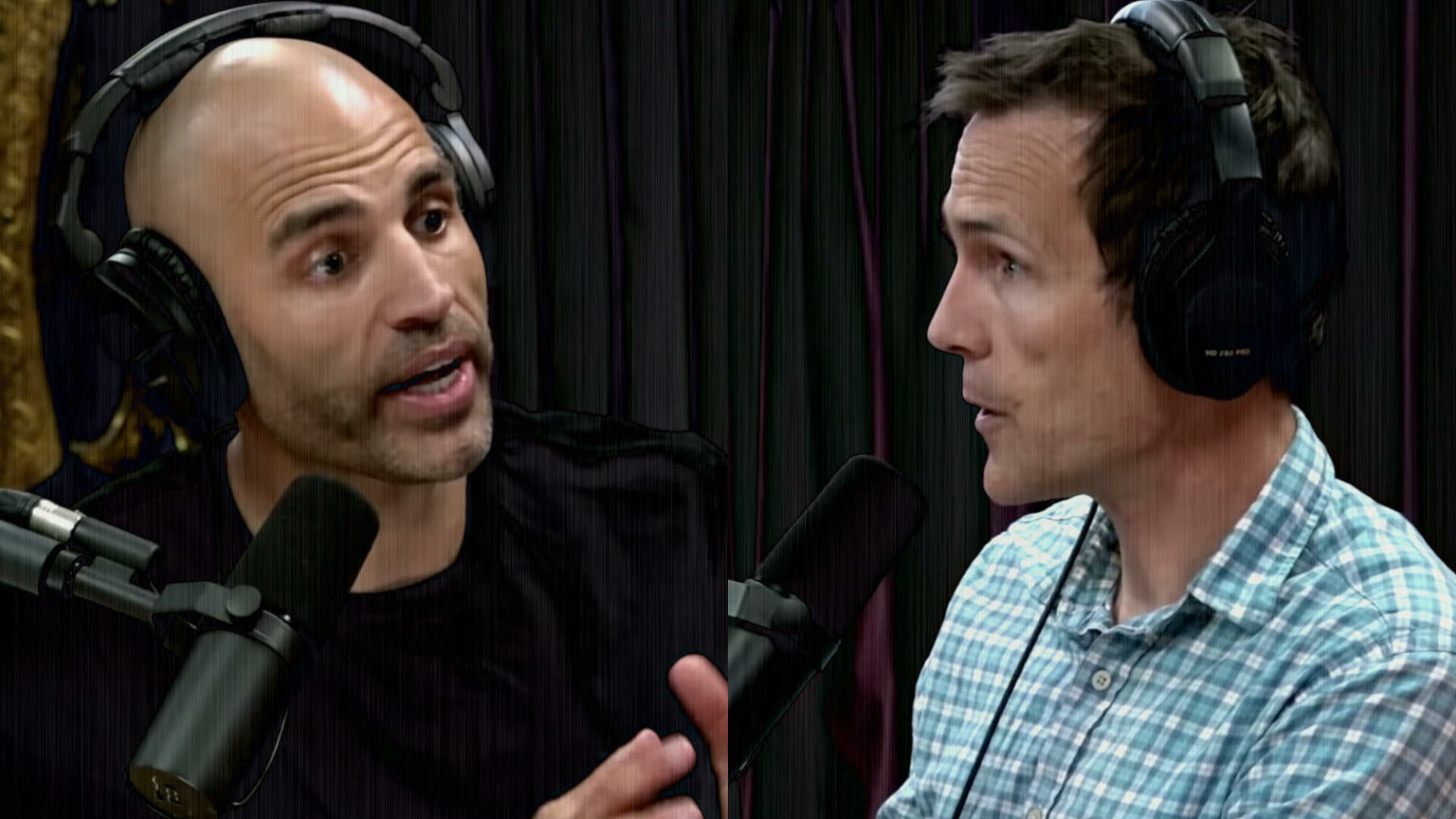I spend hours each week looking up relevant studies, old and new. Oftentimes I have to dig pretty deep to find them. This means hunting down lead authors on papers and hounding them with email requests for full texts. Other times it means reading the reference list on one paper, which leads to 3 more papers I need to read. Then reading those 3 papers and their reference list leads to another 10 papers, and further on down the rabbit hole. Fortunately or unfortunately, I don’t have to dig nearly that far when covering what is going on in pop culture nutrition because the internet lets me know about it.
After the ‘documentary’ The Game Changers release on Netflix, I was immediately bombarded with thousands (I’m not exaggerating) of messages asking for my opinion. At first, I resisted. I was pretty certain that I’d be watching another typical propaganda film disguised as a documentary and I’m a busy dude and I don’t like wasting my time. I also knew that if I didn’t like the film, I would likely endure the full wrath of the zealot vegan community (I want to be clear here, not all vegans are zealots, I’m specifically referring to the crazies) and as much as I don’t mind a good scrap online, it gets tiring dealing with overzealous idiots. However, I also know that a lot of people were influenced by this film and I felt a certain responsibility to give my genuine thoughts on it. I remember telling —– before we watched the film, to
“try and give it an honest chance, we don’t want to go into it with a negative mindset.”
Can I say that I didn’t have a negative bias towards the film before watching it? Of course not. I had already heard some of the claims that had been made via social media and was not looking forward to enduring the film, but I did really try to give it an honest chance. Sadly, it was a steaming pile of crap. I did a full critical analysis of the film, in case you missed it.
As expected, the zealots were unhappy, with some vegan zealots going as far to attempt a debunk of my critical analysis. Others claimed I was in the pocket of ‘big meat/dairy’ and the other typical nonsense. I thought I was done with the film after things had died down… that is until Joe Rogan messaged me on twitter and told me that he had Chris Kresser and James Wilks (the narrator of the film and one of the producers) debate on his podcast. Rogan had mentioned that it didn’t go well for Kresser and was interested in my thoughts.
Not long after, I started receiving thousands of messages from others asking for my take on the debate. Which brings us back here. The debate was almost 4 hours long and putting this together took me many hours, but here it is. I don’t have any illusions that this will change the minds of anti-meat or pro-meat hardliners, but I hope that maybe, just maybe, it will make people think about claims and evidence needed to support said claims.
Full disclosure: I was not a fan of Kresser as a choice for the podcast. As James points out about 87 billion times on the podcast, Kresser isn’t an expert in nutrition. Kresser also made a few big mistakes that James was able to capitalize on to really make Chris look bad. James made a few good points on the podcast, but he avoided most of Kresser’s good questions and points or deflected them with various logical fallacies as I will describe below. Much of the debate centers around Wilks attempting to discredit Kresser personally. If James ever decides that he wants to run for political office, he definitely has the debate playbook down. In the interest of fairness, I will point out where James makes good points. Just in case anyone was wondering, yes… I do know how to read a Forest plot. Now, let’s descend into madness, shall we?
Note: I watched the YouTube video so my timestamps will differ from those on the podcast.
Erratum: I made a couple of small mistakes in my analysis of the debate so I have highlighted them and clarified the mistakes. I had a 2 hour phone call with Dr. Avi Bitton, one of the people who helped prep James Wilks for this debate and Dr. Bitton was nice enough to point out the mistakes while still being intellectually honest, non accusatory, and simply exchanging ideas. Avi seems like a wonderful representative of the vegan community and I wish he would have been on the debate rather than James.
1:50 – James states that it was never claimed the gladiators were vegan or vegetarian, but rather that they ate a predominantly vegetarian diet and claims that the study they referenced was the only known gladiator burial site in the world at that time. But this is not true, since the study that he referenced sites several other studies of gladiator burial sites are referenced including York (he did reference this), Pompeii (Italy), Trier (Germany), and Patras (Greece). [1] That said, there is some confusion on my part regarding the timeline, as the original article he read on the subject was written in 2009 whereas the reference I found from the authors is from 2014. It’s possible he read a different paper than I did and if so I welcome his feedback or anyone else who is aware of said paper. So it is possible that in 2009, perhaps that was the only gladiator burial site to have been discovered, but not according to the paper I read. Additionally, he neglects the author’s discussion about the geographic data that indicate various areas may have simply consumed what was plentiful in that area. For example in Thebes, a large difference in sulfur content was found indicating the consumption of seafood.
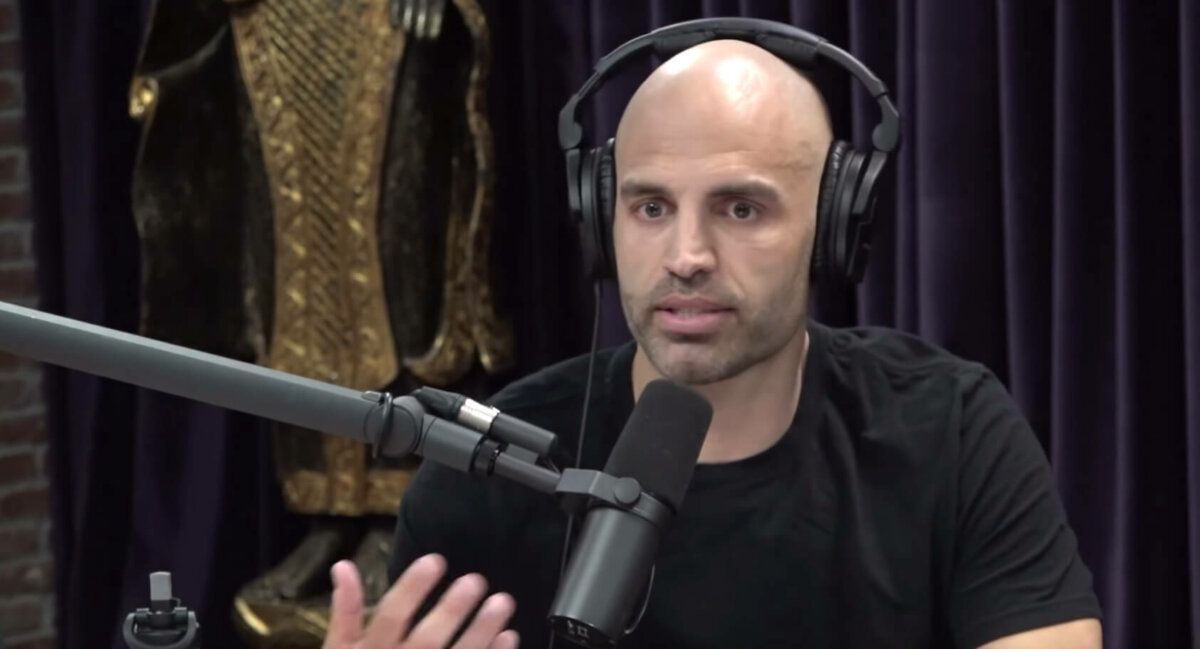
5:05 – James makes an appeal to authority, in fairness, he says that it’s a logical fallacy but if you aren’t a nutrition expert you need to look to some authority. Ok, at least he’s self aware. He talks about the WHO, AHA, and Dietary Guidelines and their recommendations to limit meat consumption. What many people don’t know, and I assume James doesn’t know, is that these organizations rely nearly exclusively on epidemiological data. In the case of the dietary guidelines for the USA, my advisor Dr. Donald Layman found out through a correspondence with their office, that they exclude any study that doesn’t have at least 50 subjects per group. This essentially eliminates the vast majority of highly controlled randomized control trials and relies heavily on epidemiology and poorly controlled free living studies. I’m not blaming James for not knowing this, most people don’t, but it’s important to understand when I talk more about why meat has associations with cancer, heart disease, etc (albeit weak effect sizes).
6:00 – James makes a big deal about Chris saying his diet is plant based because “we have to base it on calories.” I agree with James, but I hope he is willing to stick with this same line of logic later when we talk about lean meats vs. fatty meats and the epidemiological evidence regarding meat and disease (spoiler alert, vegans and vegetarians eat less calories on average than meat eaters by about 600 and 250 kcal less per day respectively and this difference is a massive confounding variable when looking at the epidemiological data). [2]
15:00 – James does a really good job of cornering Chris on his statement regarding dairy and cancer based on a meta-analysis that Chris sited. Chris had stated that 84% of the studies showed no association with cancer or a decreased risk of cancer with dairy consumption. James brought up that the data from the various studies found that 13% of the studies showed a decreased risk of cancer, 71% showed no association with cancer. 16% of the studies showed an increased risk of cancer with dairy consumption. James then makes a brilliant debate move and flips the conversation on its head stating that he could state that 87% of the studies showed no risk or an increased risk of cancer. Both Chris and James are right, but the REAL story here is that the data for dairy even being associated with cancer is very weak. It is also weak for showing a protective effect on cancer. It is very STRONG for the data demonstrating that dairy consumption is NOT associated with cancer risk. James flips Kresser’s statement on its head to make it appear that he is being disingenuous, but he really is not.
Chris was addressing the claim in the film which was that dairy CAUSES cancer.
Edit #1: The film never claimed explicitly that dairy causes cancer. The film brought up studies in regards to dairy and prostate cancer specifically. This was my mistake. The reason I likely made this mistake was that there were a lot of claims in the video and I thought I remembered this claim but it was specific to prostate cancer. That said, my takeaway from the film was the implication was that dairy causes cancer in general. Others may disagree, but I know many others who took the same general takeaway message. That being said, this was a mistake on my part because they never explicitly made that claim.
James does a great job deflecting this and turning it against Chris by dissecting his statement and accusing Chris of purposefully misleading people. I’m not sure of Chris’ intentions, but that is a pretty weak argument for Chris attempting to purposefully mislead people based on a quote that was parsed out and dissected. This reminds me of brilliant politicians who dissect word upon word out of quotes of other politicians to corner them in a debate. One of the fundamental principles of logic is that if someone makes a claim the onus is on them to back up the claim with evidence. The film claimed that dairy causes cancer. Instead of the onus being on James to defend the films’ claim, he instead creates a red herring out of Chris’ quote. Regardless of what Chris’ exact quote was, the vast majority of the evidence does NOT support the film’s claim that dairy causes cancer and most of the evidence can’t even make an association between dairy and cancer. Further, a recent meta-analysis demonstrated that dairy was not associated with cancer but a moderate intake of dairy was associated with a 25% decrease in ALL CAUSE mortality. [3] To be fair, high consumption of dairy had the same risk as low consumption of dairy, so I’m not prepared to say that dairy decreases your risk of death based on this study. But it certainly does not support the contention of the film that dairy is unhealthy and causes cancer. Shouldn’t this be the real story? That dairy doesn’t increase the risk of dying for any reason and if anything a modest intake may have a protective effect? We can’t say for sure because it’s not appropriate to draw causation from epidemiological evidence, but it certainly does not support the claims in the film.
Further, a recent meta-analysis of US men found no association between prostate cancer (a cancer that James specifically points out that dairy is linked to) and low fat dairy intake and found only a modest association in late stage cancer for full fat dairy consumption (remember that James said we need everything to be standardized to calories… I agree). [4] This was supported by another meta-analysis that showed no association between dairy and cancer except in those who consumed full fat dairy. [5] If dairy itself was truly responsible for the increase in prostate cancer risk we should see equal distribution of increased cancer risk amongst all types of dairy, not just full fat dairy. It is much more likely that it is the increased fat content of full fat dairy contributing to this risk, especially since higher saturated fat intake is significantly associated with prostate cancer. [6] Whole milk has 4.6g of saturated fat per cup, over 35% of the daily recommended intake of saturated fat. That said, I’m not sold on the link of high saturated fat intake to prostate cancer as people who consume more saturated fat tend to have a greater abundance of other unhealthy habits. It’s important to keep in mind that these data are also epidemiology, which can only establish correlations between two variables, not cause and effect. Keep in mind that one study found that eating ANYTHING at ANYTIME increased the risk of developing colorectal cancer. [7]
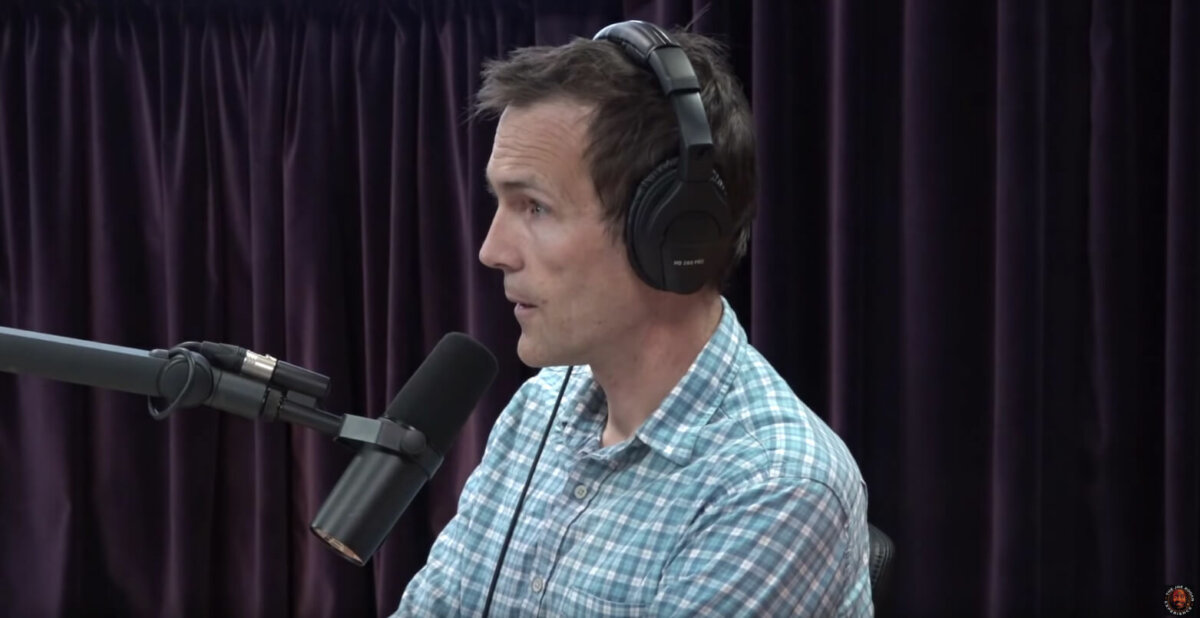
At this point of the debate I see that James is constructing the narrative of the debate in a way to attack Chris’ claims, rather than having to defend the claims in the film. Now I’m not a huge Chris Kresser fan, but it’s FAR easier to attack in a debate than it is to defend. When you are on the attack you know what statements you want to address and how to get the person you are going after and back them into a corner. When you are on the defensive you have little idea of which of your statements the opposing side is going to attempt to pick out and parse. To my mind, the film made the original claims and the onus should be on the film to defend those claims, not attack the people who have attacked the claims, but hey, I’m definitely biased on this one.
25:15 – Joe makes a great point. He says (paraphrasing) “if you had 100 studies, and 70 of them showed an increased risk of cancer, wouldn’t you say that it causes cancer?” He has taken James’ logic and turned it around against him. James attempts to deflect by saying that he wouldn’t necessarily think so if the studies were all epidemiology, but epidemiology is the preponderance of evidence that is used to support the basis of the films claims that dairy and meat cause disease. When it doesn’t fit with James’ bias however, he dismisses it. This becomes a theme throughout the debate, James uses logic when it fits his bias, then discards the same logic when it does not. That’s called cherry picking.
28:00 – James makes the claim that a meta-analysis that showed 50% of the studies demonstrated a link between prostate cancer vs. 50% that didn’t was evidence of a causal relationship of dairy consumption with cancer. Guess what made up the vast majority of the evidence of this study? Epidemiology data. The same data that James said you couldn’t draw causation from less than 3 minutes earlier. I wish I could say I was shocked, but I’m not.
Edit 2: James did not bring up the meta-analysis being discussed, Chris brought it up originally.
32:00 – Joe asks if 65% of people are lactose intolerant couldn’t this possibly explain some of the associations with prostate cancer because it might cause inflammation in those people? James takes this moment to jump all over this opportunity. This represents one of the most common misconceptions regarding inflammation, that all inflammation is equal and affects all tissues. Inflammation due to intolerance is localized to the GI tract. Inflammation in one tissue does not necessarily translate to systemic inflammation and certainly not inflammation in other tissues. If this was the case we would expect to see dairy increase inflammation, but in fact we see the opposite as a recent systematic review of randomized controlled trials involving dairy concluded that “the majority of studies documented a significant anti-inflammatory effect in both healthy and metabolically abnormal subjects.” [8]
36:55 – James points out that Game Changers is the first documentary to be approved by the US Military. Clearly an appeal to authority logical fallacy. James just made a huge deal out of the fact that Chris isn’t an expert on nutrition, but now appeals to the authority of the US government? Well those were the same folks who swore up and down Iraq had weapons of mass destruction so I’m not sure that they should be the beacon of truth for nutrition.
49:15 – James calls out Chris for ‘making up definitions of low/moderate/high carbohydrate that aren’t in line with the scientific community’s definition’. I agree with James on this, but the purpose here just seems to simply attack Chris rather than address the core of the debate, which is whether or not animal products are bad for you. It just seems like a personal attack here, even if James is correct, I don’t really see the relevance. James accuses Chris of making things up. Certainly he did make up those definitions not based on the definitions in the scientific community, but the film also made up plenty of their own asinine claims.
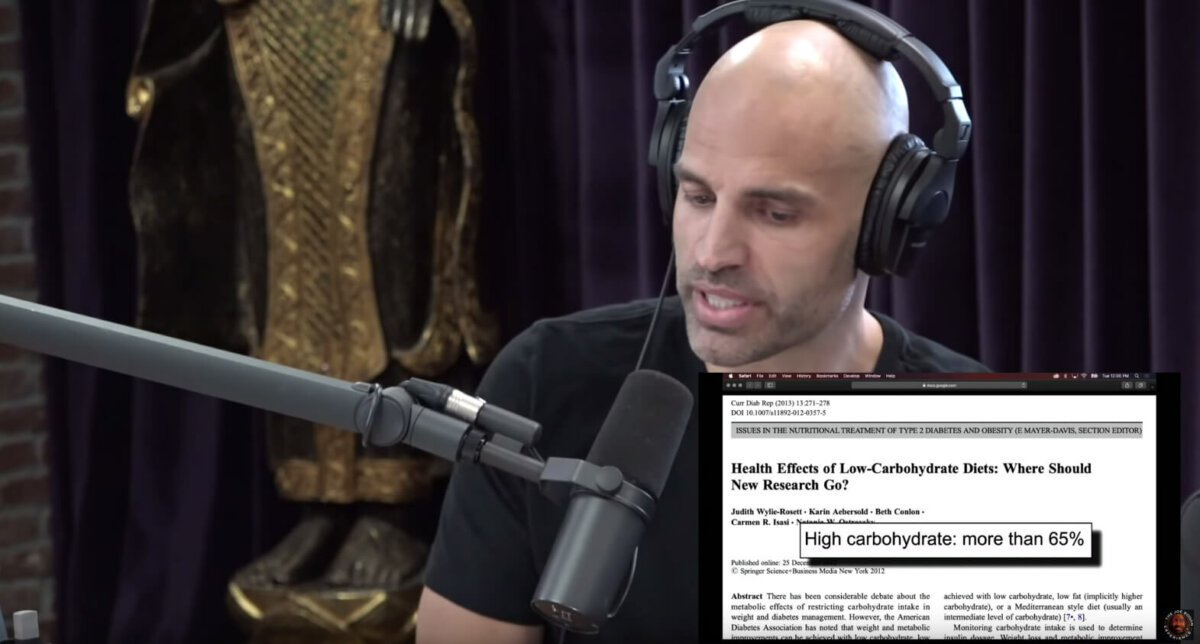
53:00 – To that end, Chris does a terrible job attempting to justify the carb ranges he recommends. He should have simply said that they are his opinion and that he didn’t have hard evidence to justify them. It’s fine to have opinions as long as you state it as such. By attempting to validate them he strengthens James’ argument. Chris should have stuck with the consistent message that he is not advocating for low carb diets REGARDLESS of the definition you choose for ‘low carb.’ Instead he let James put him on the defensive continuously and divert the track from the main focus of the debate which should be addressing the specific claims in the film.
55:00 – James points out that Chris has never been published in scientific literature. Again, I don’t get this. James hasn’t been published either, that is not the core of the debate. About an hour into this I think I understand James’ strategy which is to divert the attention from the claims in the film and attack Chris’ reputation and try to place doubt about Chris as an expert. If I’m being honest, I agree that Chris is not an expert and I have cringed at some of the things he’s said in the past, however, JAMES ISN’T AN EXPERT EITHER AND HASN’T PUBLISHED IN THE SCIENTIFIC LITERATURE. I will give Chris this, he never ad hominem attacked James directly (that I’ve seen so far anyway).
56:50 – James gets in a killshot on Chris when he asks him if Chris knows how to read a Forest plot. Chris says he doesn’t so James patronizingly ‘shows’ him how to read it. James kills him on this point and in my opinion Chris should have simply acknowledged that there may be an association between heme iron and CVD but if that was the case why do we not see an increase in CVD indicators in randomized control trials when lean meats are used and calories are equated? [9] Instead James makes Chris look silly and credit where credit is due, James’ team obviously did a great job preparing him for this specific part of the debate. That being said, James’ argument is very disingenuous because Chris’ statements about heme iron only being associated with meat in studies performed in the USA and not the rest of the world is true! A direct quote from the paper that James pulls the Forest plot from says “with respect to heme iron intake, we found a significant association only in the studies that were based on American cohorts.” [10]
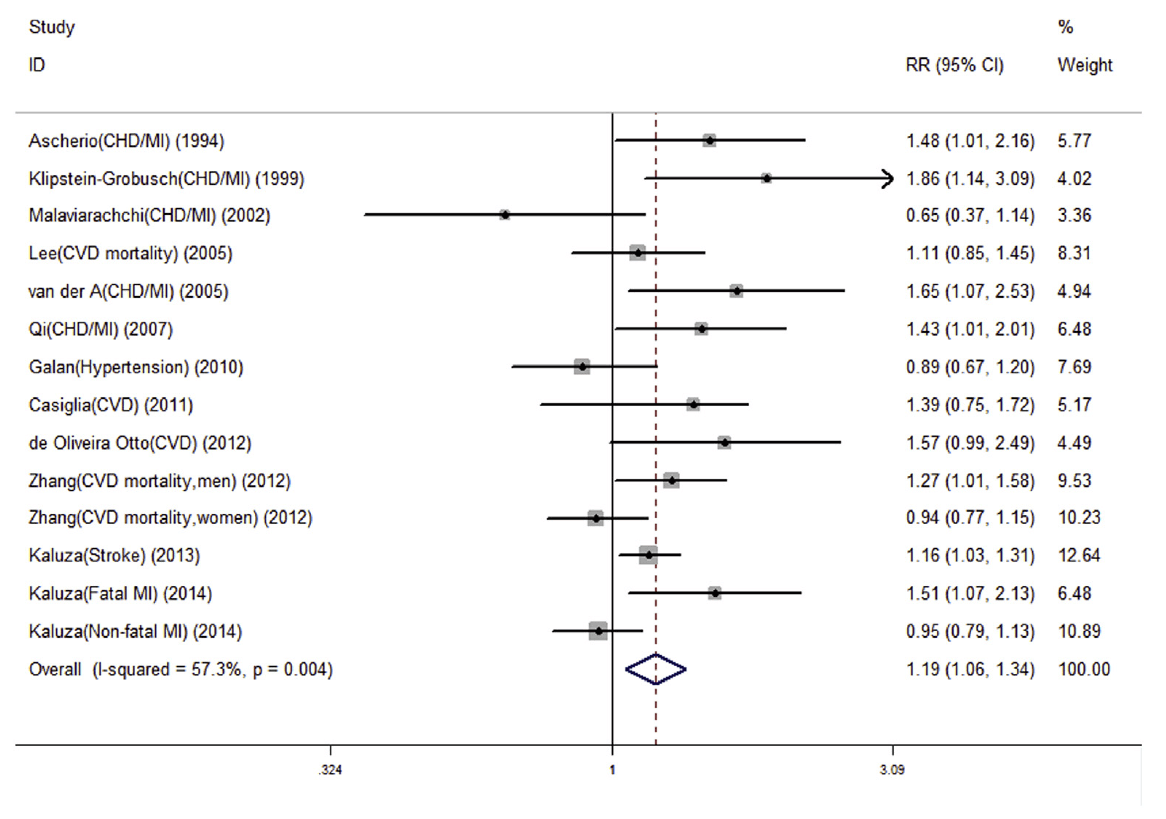
This in spite of the fact that 2.5 more studies were done outside of the USA. Regardless of Chris being able to read a forest plot or not does not change what the authors found in the study.
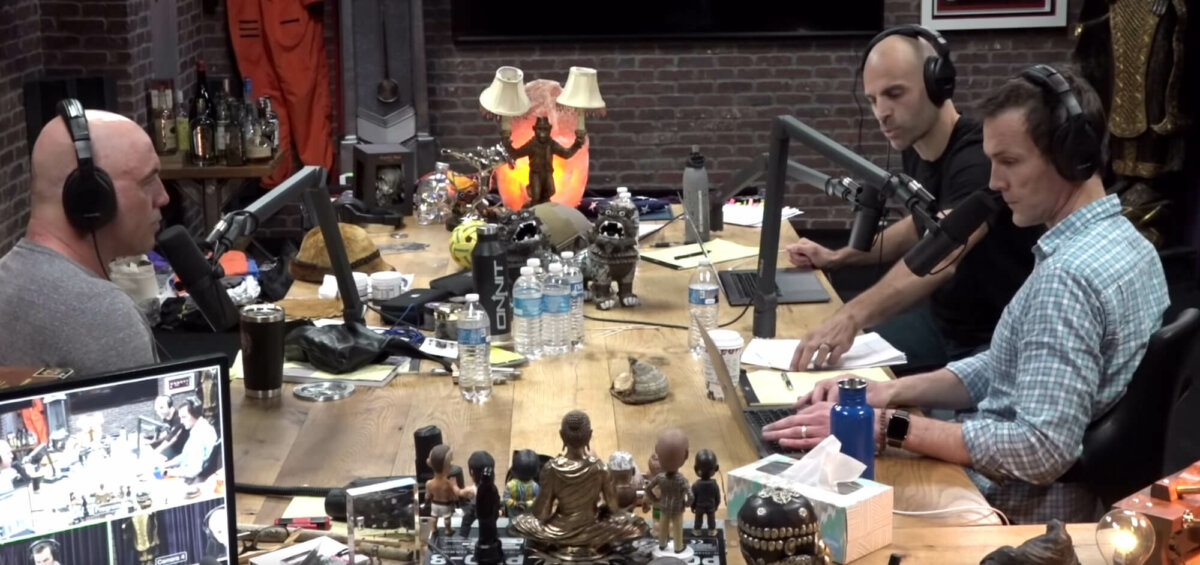
Edit #3: What I did not know is that previously Kresser had claimed that specific countries in the analysis like the Netherlands did not show an association between heme iron and CVD which is NOT true, as the Netherlands does show an association between CVD and heme iron intake, although the overall data outside the US shows no association between heme iron and CVD.
1:01:12 – James attempts to deflect Chris’ point about plant foods offsetting the oxidative stress from heme iron by saying that if you work out do you want your body to also have to deal with oxidative stress from eating meat as well as the workout? This is where it’s obvious James has no concept of what he’s talking about. All oxidative stress is not created the same. When you exercise, your oxidative stress increases but what James neglects to mention (or perhaps just isn’t aware of) is that when you exercise, you increase oxidants and free radicals but your total antioxidant status increases simultaneously to handle that stress and over time exercise decreases your long term oxidative stress load by ramping up endogenous antioxidant systems. [11][12] Further, the post exercise state appears to be a net reduced oxidative stress state due to the increase in anti-oxidant status. [13] Therefore, James’ hypothetical scenario that your body will have to deal with heme iron oxidative stress PLUS exercise oxidative stress is nonsense because your body already does enough on its own (actually more than enough) to counter exercise induced increases in oxidative stress.
1:09:00 – James really picks apart Chris’ statement on B12. Again, he puts Chris on the defensive and Chris is having to respond to James.
1:15:40 – I get a nice shoutout from Joe in regards to James’ statement that he spent 1000 hours studying peer reviewed research. Do I question that statement? You bet your ass I do. Do I have any way to disprove it? No I do not. Is it possible? Certainly. Do I personally believe it? No, but that’s just my opinion. I think James’ team prepared him well for this debate and especially with regards to focusing on attacking Chris so that he didn’t need to spend as much time defending the claims made in the film. If the other claims in the film and claims James has made weren’t so asinine, I would be more inclined to believe him on the thousand hour claim. That said, it’s possible so I want to acknowledge the possibility, even though I am personally skeptical.
1:20:09 – Wow, James’ team prepped him extremely well, going so far to dig through Kresser’s ebook. Again, James is simply using this to discredit Kresser as an individual without having to back up the claims of the movie, but that’s obviously what his game plan is and he is executing it very well. A LONG discussion ensues regarding B12 and the summary is that vegans have lower levels of B12 in general, but many omnivores are also low in B12 so many people should likely supplement with B12. James used this to continuously go back to attack Chris regarding his criticisms of James’ B12 statements in the film.
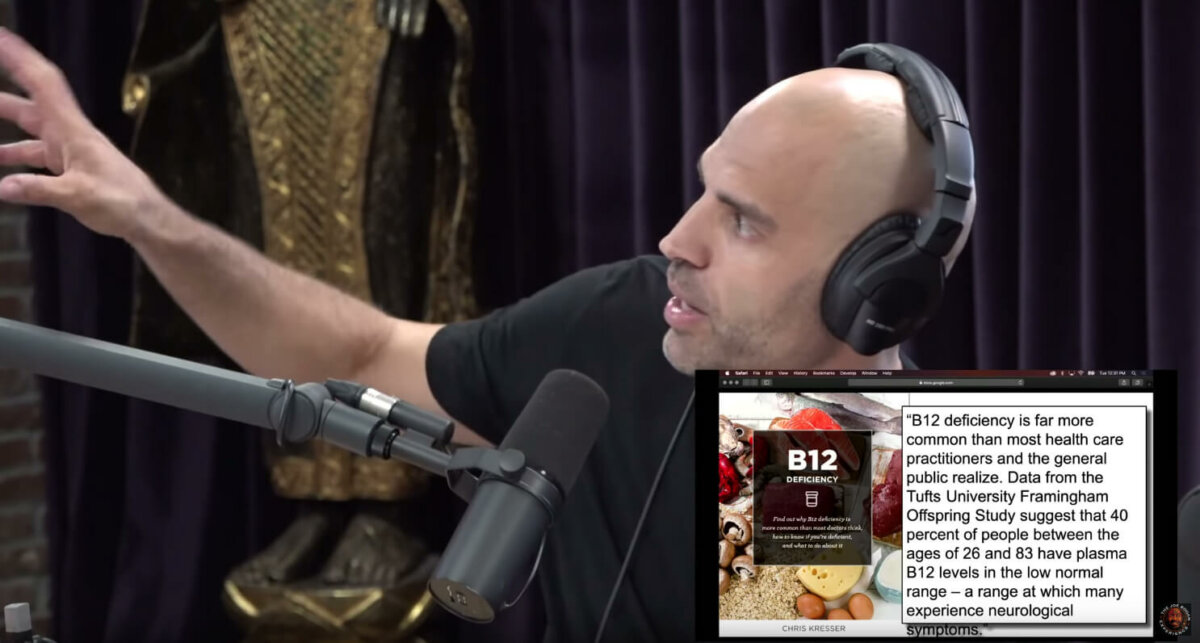
1:52:10 – James essentially claims that Chris needs to take the position he is taking because he sells supplements and protein powders. This is just a straight up personal attack and has nothing to do with the claims in the film. What’s more, James is inferring Chris’ intent where James has been upset in the past with people inferring his intentions. Further, while Chris may have conflicts of interest, the film was produced by James Cameron, who owns a company that produces pea protein, so this entire line of logic is just absurd. This is another case of James using a specific line of logic when it suits his needs, but then discarding it when it doesn’t. James is all about the conflicts of interest when it comes to other people who criticize the film, but not the conflicts of interest from the film.
1:54:20 – James brings up the Forest plot thing. Again.
1:57:24 – James attempts to discredit a meta-analysis published in the Annals of Medicine that concluded that red meat and processed meat present very little overall risk to the population. [14]
James makes a big point that it came out the day before the film, as if somehow that was orchestrated. James may not have experience publishing scientific data but I do. You submit a manuscript MONTHS before it is ever published. It would have gone through multiple revisions (most likely) and in order for it to be purposefully published before the movie, that would mean that the journal would have to be in on this ‘conspiracy.’ To which I would reply that since we are just making up accusations, I could make up all kinds of stuff. In fact, why couldn’t I imply that The Game Changers came out the day AFTER this landmark study as some kind of conspiracy? This sort of tactic is absolute pandering to the lowest common denominator. James NEVER actually addresses the data, instead he uses his well tuned tactic of attempting to imply some sort of mega conspiracy and discredit the researchers themselves instead of ACTUALLY addressing the DATA. Instead he chooses a series of logical fallacies in an attempt to discredit the review rather than addressing the review itself.
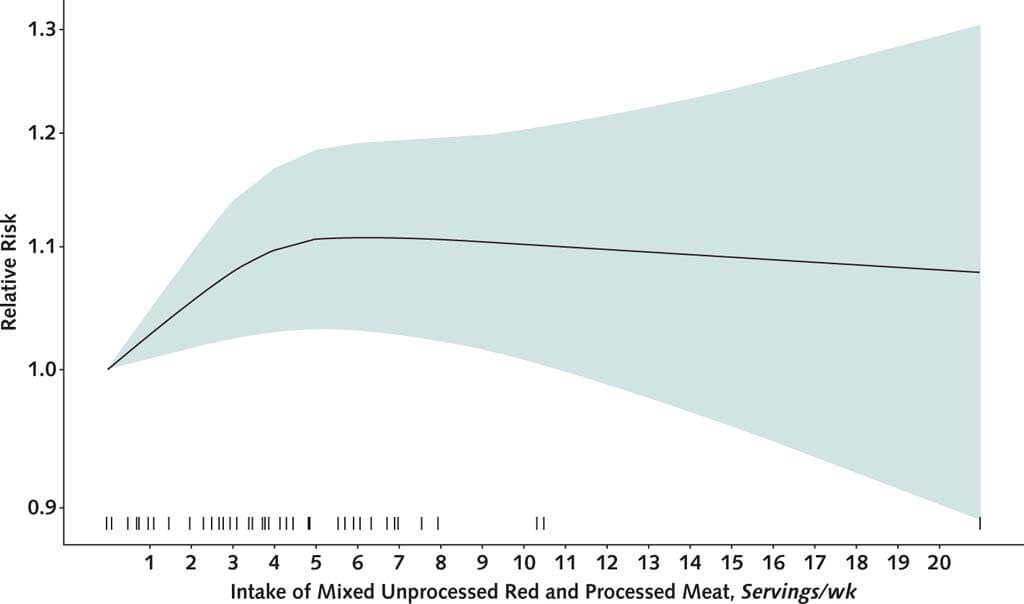
Since James didn’t address it, I will. The meta-analysis that James is referring to was extremely rigorous as they performed a systematic review and dose response meta-analysis of the effects of red and processed meat on cancer while assessing for bias and certainty of evidence. The researchers did find associations between red/processed meat and cancer, however, the associations were small, almost completely based on weak epidemiological data, and the certainty of evidence was low. The authors state
“Our systematic review supports the association between red and processed meat and increased risk for cancer. The MAGNITUDE of red meat’s effect on cancer over a lifetime of exposure was, however, very small, and the overall certainty of evidence was low or very low.”
Disease is also likely small (if at all because again it’s based virtually all on epidemiological data).
For example, I could have two treatments, treatment A and treatment B and at the end of the study, one might produce an arbitrary outcome score of 99 and the other 99.5. That’s not a very big difference, but if I had 10,000 data points, it may end up being statistically significant (p<0.05), however, the effect size is going to be very small. This is similar to what the researchers found based on examination of 56 cohort studies with over 6 million participants. Keep in mind that these studies are only correlational in nature and James stated himself earlier in the debate that you can’t draw causation from correlation. James of course stated this when correlations were brought up that did not fit his bias. Although the researchers found a small but significant correlation between cancer and meat intake, it is difficult to compare observational studies between omnivores and vegans as I mentioned in my previous analysis. “Omnivores” encompass people eating the standard western diet, which is, by and large, crap. Vegans and vegetarians have significantly more health seeking behaviors like exercise, eating fewer calories, and a myriad of others. As I mentioned in my previous analysis, when studies have been done correcting for some of these health seeking behavior differences, they do not see differences in mortality rates between vegetarians and non-vegetarians.
James then tries to discredit the group of researchers (NutriRECS) that performed the study by bringing up another meta-analysis they conducted on sugar, which concluded that sugar was ok to consume. James is now combining a red herring logical fallacy with an ad hominem logical fallacy. That is, rather than addressing the ACTUAL study itself, James points out a different unrelated study in an attempt to discredit these researchers. James jumps on the bandwagon fallacy of ‘everyone knows sugar is bad’ so anyone who says it’s not bad must be an idiot. James pulls out a statement from their review on sugar stating
“at present, there seems to be no reliable evidence indicating that any of the recommended daily caloric thresholds for sugar intake are strongly associated with negative health effects.”
James uses this as a way to discredit NutriRECS, but note how he has no ACTUAL criticisms of the data from either of these papers, how they collected it, or how they synthesized it. If the study was so egregious, why didn’t James and his team explain why the data that NutriRECS collected is incorrect or why their conclusions based on that data is incorrect? Why did they not criticize their methodology if they disagree with the findings? They have access to the same data that NutriRECS does, but James doesn’t address it at all. I like to actually look at the data and make my own opinions. First off, NutriRECS didn’t say that it’s ok to eat a ton of sugar which is what James appears to be implying. The study said in the conclusion that
“guidelines on dietary sugar do not meet criteria for trustworthy recommendations and are based on low-quality evidence. Public health officials (when promulgating these recommendations) and their public audience (when considering dietary behavior) should be aware of these limitations.”
Well, I agree. I know it’s not popular to say this, but then again, I’ve never had a problem going against the grain: I don’t think sugar is the great evil everyone else has accepted it to be. Please silence your gasps, I hear them all the way through the internet.
I used to be very anti-sugar in the early 2000s and as more and more data came out I simply couldn’t support my position anymore in terms of believing that sugar was an independent variable that significantly contributed towards disease. Yes, sugar is easy to over consume so that people tend to overconsume it and increase their overall caloric load, but I have seen no compelling studies that concludes that sugar independently causes disease when overall caloric intake is controlled. [15] I touched on this briefly in my appearance on Rogan in September of 2018. Sugar is associated with disease because it is easy to overeat and a very dense source of calories. But if sugar was a disease risk independent of calories, we should see differences in weight loss/gain and health markers when diets that are high and low in sugar are compared with calories equated, but we don’t see that. [16][17][18][19][20] I’m not saying you should eat sugar, nor is NutriRECS. I’m saying that James is completely misleading people with his argument. Even if the NutriRECS meta-analysis on sugar was somehow incorrect (it’s not) that doesn’t change the fact that bringing it up is a red herring to avoid actually addressing the data in the current study being discussed.
James then says that the Beef Checkoff people view their emails more than anyone else and that it can’t be a coincidence that this study came out the day before the film. Another appeal to conspiracy as well as an ad hominem logical fallacy. Beef Checkoff did not sponsor this meta-analysis and NutriRECS is not funded by Beef but James argues strongly that this study can be dismissed because of this ‘conspiracy ‘. James doesn’t say this specifically, but in my opinion (and the opinion of any reasonable person listening) that is what he is implying. So let’s go down the rabbit hole and examine this ‘conspiracy’ for a moment.
NutriRECS is an international group of over 20 researchers who publish systematic reviews that “aim to produce trustworthy nutritional guideline recommendations.” [21] ONE of the authors on the study is Patrick Stover, the vice chancellor and dean of the AgriLife program at Texas A&M. AgriLife is partly funded by the Beef Checkoff program. However, AgriLife did not join the consortium at NutriRECS until AFTER the meta-analysis had been performed. Being that publishing research can often taken from 6-12 months from initial submission to publication, I have little reason to doubt this, especially since I would guess this submission would have been criticized thoroughly due to the controversy it was bound to start. That said, I can’t say for sure because I’m taking the word of Stover on this. Regardless of that, AgriLife did over $170 million of research in 2019 and only $2.25 million of that was funded by the beef industry. [22] So let’s just trace back this line of logic. James is claiming that since ONE researcher (of over 20 in NutriRECS) from ONE program (AgriLife), gets just over 1% of its research budget from Beef and therefore the entire meta-analysis should be dismissed? ABSOLUTELY LUDICROUS AND UTTERLY HYPOCRITICAL. If I disagree with a study’s conclusion, my first move isn’t to discredit the researchers or make claims about the funding sources. My first move is to examine how the study was conducted, the data that was collected, and then assess whether or not I agree with the conclusions. In the VAST majority of cases, if I don’t agree with the conclusions, I can read the methods and results sections and determine why I don’t agree with them. If someone’s only criticism of a study is a funding source, it says more about their bias than the bias of the researchers.
That said, there is no evidence that this particular study was funded by beef, even if one of the programs that one of the authors is a dean of received 1.3% of their yearly funding from the beef industry. Interesting that James makes a big deal about the conflicts of interest for studies he doesn’t agree with, but fails to mention the enormous conflicts of interest for The Game Changers. Nearly every expert in the film sells vegan products or books and several of the producers have huge stakes in plant protein. In particular, James Cameron and his wife have invested $140 million dollars in a pea protein company. [23] How about $140 million direct conflict of interest vs. a $2.25 million dollar indirect conflict of interest? Further, there is evidence that this film has ties to Beyond Meat (a 1.5 billion dollar company) as Chris Paul (a producer of the film) is an investor in the company. [24] Yet again, another example of James using a specific logic when it suits his needs and then discarding it when it doesn’t.
I only bring up these conflicts of interest to note the absolute hypocrisy of James’ position. Unlike James, I can actually use data and empirical evidence to base my arguments on rather than resorting to logical fallacies. During his entire diatribe regarding this meta-analysis he NEVER addresses the data. Not once. He instead relies on a myriad of logical fallacies (ad hominem, red herring, etc) in an effort to discredit NutriRECS. If he has such a great team of experts, why did none of them verse him on the data from this study and how to address it? Why was he so well prepared to attack NutriRECS but not the ACTUAL DATA itself? I mean after all, he can read a Forest plot or so I’ve heard. Where are his criticisms of the way the data was collected and analyzed? Not once does he address it.
2:00:10 – James makes another appeal to authority of the hundreds of scientists that support his side. Logical fallacy… moving on.
2:03:40 – James says
“You really need to look at the way a study was designed to see if it was viable.”
JAMES I COMPLETELY AGREE! SO WHY DID YOU NOT DO THAT WITH THE META-ANALYSIS YOU WERE JUST TALKING ABOUT? James spent 10 minutes creating various logical fallacies behind why we shouldn’t trust NutriRECS and even went as far to imply that they were funded by Beef, which there is no direct evidence of, but then makes a big deal about how we need to rely on examining the way a study was designed before determining how much quality it has. This level of hypocrisy is astounding. At this point I am really irritated with Chris for not pointing out these blatant hypocrisies.
2:05:34 – Again, James criticizes Chris for citing the Annals of medicine paper, implying the paper is bad, while NEVER addressing the actual data.
2:06:00 – James says
“the consensus of the scientific community”
referring to people disagreeing with the Annals of Medicine Paper. That is the consensus of James’ scientific community, not the community as a whole. I know many scientists who agreed with the paper’s findings.
2:11:21 – James makes another appeal to authority..
2:11:51 – Did you know that James can read a Forest plot? Well he can and Chris can’t. Just in case you had forgotten, he wanted to remind you. Now he’s resorting to attacking Chris personally, AGAIN, since he can’t argue the data very well. He says that Chris isn’t equipped to evaluate the data while simultaneously avoiding evaluating the data.

2:12:14 – James brags about his thousands of hours of research stating he wouldn’t just read the conclusions, he would dig through the entire paper. Really James? If that’s true, why can’t you give ONE piece of ACTUAL criticism about the methods of the Annals of Medicine paper, if you are able to read a forest plot so well?
2:13:10 – James FINALLY addresses the Annals of Medicine study saying that they used an analysis that was inappropriate. He never states why it was inappropriate or the reasoning or line of logic he used to make that conclusion. I thought he said he was a combatives instructor. How is he qualified to make that evaluation?
2:23:00 – James continues to beat a dead horse that you can be vegan and be healthy. Never in the entire debate does Chris ever claim that you can’t be healthy and be vegan. This is a strawman argument by James to distract from the real question of ‘is meat bad for you?’ By creating this strawman, James is trying to distract viewers into believing their only choices are vegan or the standard american diet. Chris’ point is that you can include meat as part of a healthy diet which James STILL has not addressed.
2:29:34 – James makes a big deal out of the fact that Chris used a comparison of 90% lean ground beef compared to cooked lentils or a peanut butter sandwich claim in the film. The claim in the film was that you get as much protein from a cup of cooked lentils or a peanut butter sandwich as you do from 3 eggs or 3 oz of steak. James’ making a big deal out of the 90% lean beef (he tries to turn this on Chris implying that it is an admission that Chris thinks animal fat is bad) is hysterical.
If we use the actual comparison in the film (which I addressed in my first analysis of the film) and we examine the caloric content of 3 eggs or 3 oz of even a fatty steak like a ribeye, you get about 18-20g of protein with about 200 and 228 calories respectively, while a peanut butter sandwich tops out at over 400 calories and I’m pretty sure I heard James say earlier in the debate that everything needs to be standardized to calories. It seems James only likes that argument when it works in his favor and discards it when it doesn’t. Now one cup of cooked lentils has about 17g of protein and 230 calories, so he’s a bit closer with that example, but protein digestibility and amino acid quality will both be better in the steak or eggs. Furthermore, remember that James’ assertion is that meat is bad for you. He doesn’t say ‘fatty meat is bad for you’ he has said plain as day that ‘meat is bad for you.’ Therefore, if we look at lean meats like a top sirloin, you can get 24g protein from that with only 150 calories and 6 egg whites would have over 20g protein and only about 100 calories. The reason this comparison is valid is because James continuously chooses fatty meats to make comparisons to because he knows that is where the data suggests meat is bad. Lean meats do not have the same negative health impacts and may even positively impact things like inflammation and endothelial function as I discussed in my previous game changers article. [25]
2:32:43 – James makes a big deal about how the film pushed to eliminate sugar and get nutrition from whole food sources. James must’ve forgotten about the part in the film where they served vegan mac n cheese (vegan cheese by the way has been shown to increase inflammation post meal more than regular cheese [26]), fake chicken wings, and peanut butter cheesecake. Hmm, I wonder where James’ outrage was in that case?
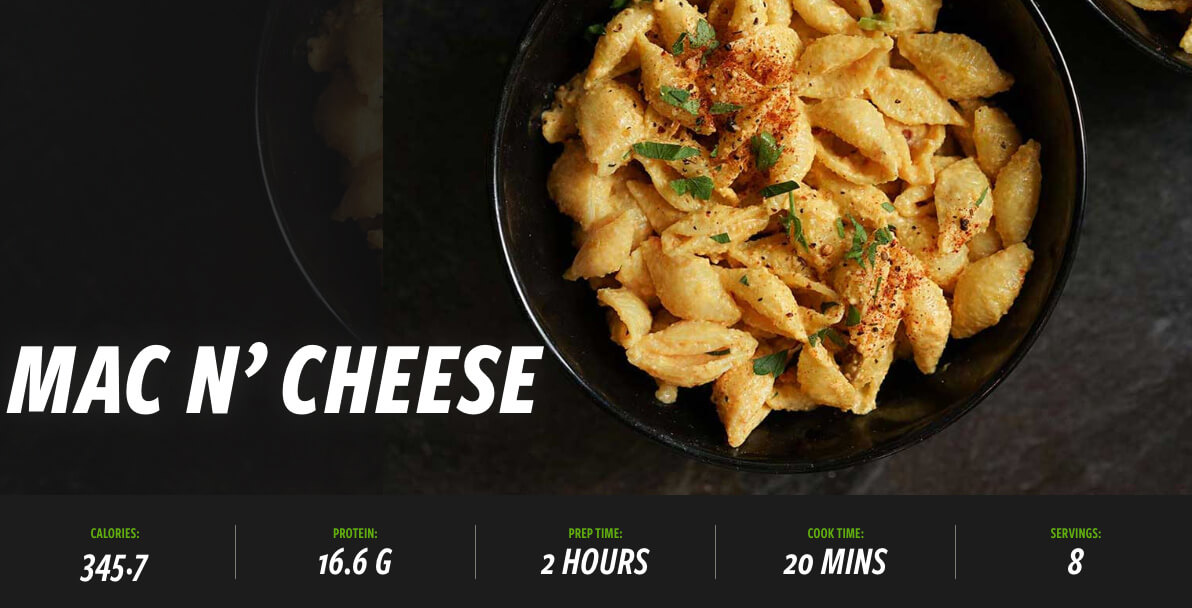
2:43:39 – James continuously pulls up meals from Chris’ website showing that they have more calories or similar calories to a peanut butter sandwich with the same protein. At this point I think Chris has completely checked out of the debate and James is beating a dead horse. Chris does a terrible job of making his points, or maybe he didn’t ever make the point, but what I took issue with in the film, was the idea that a peanut butter sandwich is portrayed as a high protein meal. In order to get 18g of protein, you’d need over 400 calories. In comparison to even the fattiest beef it’s nearly double the calories (less than double, but relatively close). James however has said he thinks that meat is bad blanketly, so why is it invalid to use a comparison to a leaner meat? Chris should have focused on James statements about meat being blanketly unhealthy but instead he let James go on another long diatribe.
2:52:54 – James states that they are basically in agreement on protein intakes for athletes. Anywhere from 1.0-2.2g/kg body weight or 2.3-3.1g/kg LBM for those in a caloric deficit. He says that he’s shown people can get that eating vegan foods. No James, you demonstrated you could get 18g of protein from a cup of cooked lentils or a peanut butter sandwich. Let’s take an athlete who is 80 kg and they target 1.6g protein/kg BW. That is a total of 128g protein. To get that from say peanut butter sandwiches, you’d need to eat about 7 peanut butter sandwiches to get it. That comes with about ~2900 calories. Doable? Sure. But this omits the fact that peanut butter is a poor scoring protein on the PDCAAS (protein digestibility corrected amino acid score) at 0.7. Wheat Protein from bread is even worse at 0.25. [27][28]
| Protein Type | Protein Efficiency Ratio | Biological Value | Net Protein Utilization | Protein Digestibility Corrected Amino Acid Score |
|---|---|---|---|---|
| Beef | 2.9 | 80 | 73 | 0.92 |
| Black Beans | 0 | 0 | 0.75 | |
| Casein | 2.5 | 77 | 76 | 1.00 |
| Egg | 3.9 | 100 | 94 | 1.00 |
| Milk | 2.5 | 91 | 82 | 1.00 |
| Peanuts | 1.8 | 0.52 | ||
| Soy protein | 2.2 | 74 | 61 | 1.00 |
| Wheat gluten | 0.8 | 64 | 67 | 0.25 |
| Whey protein | 3.2 | 1.04 | 92 | 1.00 |
Adapted from: U.S Dairy Export Council, Reference Manual for U.S. Whey Products 2nd Edition, 1999 and Sarwar, 1997. Table from https://www.ncbi.nlm.nih.gov/pmc/articles/PMC3905294/
This means that both of these are low quality proteins that do not have the same metabolic impact as higher quality proteins even at the same intake. For example, in my research, we demonstrated that whey and egg white protein were superior to the same amount of wheat protein even when calories and protein were equated. However, if total protein got high enough, it made up the difference but to get protein high enough it had to be 30% of total calories, which is a very high protein diet. [29] That would be 150g on a 2000 calorie diet, juxtapose that with the above example of someone getting only 128g of protein eating peanut butter sandwiches but with a whopping 2900 calories. So yes, vegans can get enough protein from vegan protein sources, but they will need more TOTAL protein to get the same benefits as animal protein due to the lower essential amino acid content and digestibility.
Keep in mind that the studies examining optimal protein intake were NOT in vegans, they were in omnivores, a fact James neglects to mention and Chris fails to bring up. So while 1.6g/kg bodyweight protein intake may be optimal for omnivores, it is likely that vegans will require more than that. Based on our data and a little bit of opinion, probably about 10-40% more based on the differences in leucine contents of plant vs. animal sources of protein. That would take our athlete consuming 128g protein up to ~150g protein or possibly way more per day. Is this possible to get on a vegan diet? Absolutely, but the problem really becomes an issue for athletes who are calorie restricted, like MMA athletes dieting to make a weight class.
Let’s take an 80 kg MMA athlete attempting to diet to the 155 lb (~70 kg) on 2000 calories per day. If they were attempting to get 128g protein, even using lentils would make it difficult. At 18g of protein and 230 calories, they could get it with 7 servings of lentils which would be 126g protein and 1610 calories, they would still have some room for other foods. However, since vegans likely need more based on the difference in leucine, if we bump it up to 150g per day, our athlete would need 8.3 servings of lentils, which is just over 1900 calories. Keep in mind that lentils are only about 1.3g leucine per 1 cup and the consensus amongst protein experts is to trigger muscle protein synthesis (MPS) at a meal you probably need around ~2g leucine. [30] So if you were going down this road, you’d need to consume about a cup and a half of lentils at a meal to hit this mark. For vegans reading this, if you are planning to use only vegan protein sources to hit your protein mark and you are on low calories, you will likely need to use some sort of protein powder. Soy is probably the best available. There are concerns regarding soy and testosterone but it is unlikely to be a concern if you aren’t using copious amounts of it. [31] If you are using lentils as a main protein source, you probably want to also combine it with a different vegan protein source since lentils are very low in tryptophan. Tofu is relatively high in tryptophan so you may consider combining those two protein sources.
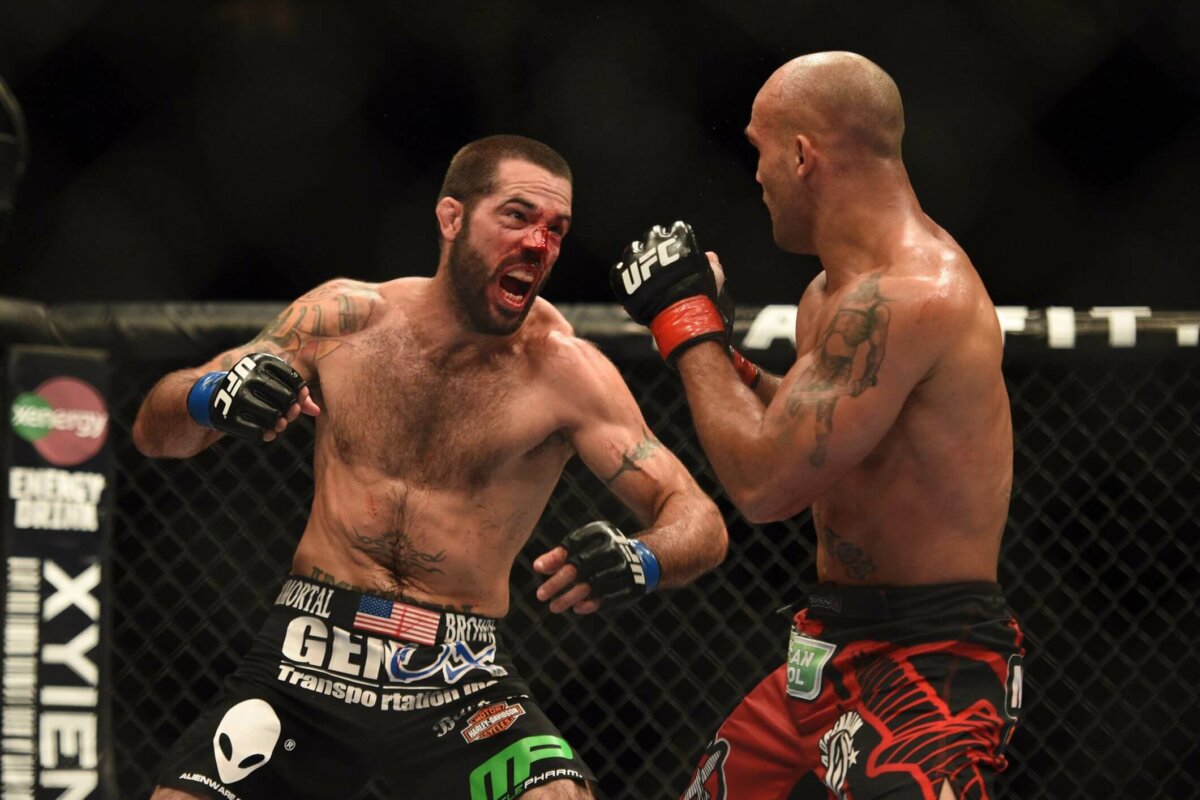
The big point to make here is that James acts like hitting protein requirements as a vegan athlete is no big deal, when in reality it will require careful planning to hit those requirements, especially in calorie restricted athletes who aren’t using isolated protein powders. This will not be near as much of a concern in those athletes consuming animal sources of proteins due to their high bioavailability and dense essential amino acid content. James then continues to nitpick Chris’ recipes on his website. Why this has relevance to the debate I don’t know. It seems like it’s James’ personal vendetta against Chris.
3:02:05 – James makes a strange argument regarding the DIAAS (digestible indispensable amino acid score) implying that it isn’t legitimate because it was tested in pigs (it’s an extremely invasive procedure that would involve needing a colostomy bag in humans, hence it’s done in animals). He then says that the FAO recommended this method and they are a panel of experts, but then reverts back to implying it isn’t legitimate. It seems like James enjoys appeals to authority except when they don’t suit his arguments.
3:02:27 – James talks about how the DIAAS wasn’t designed to measure downstream targets that indicate athletic performance or optimizing lean body mass. TRUE! The best marker we have for that is muscle protein synthesis (MPS) (at least a short term marker). The data regarding protein intake and MPS has repeatedly demonstrated that the essential amino acid content, specifically leucine, is the main driver for initiating MPS. Animal sources of protein are generally quite a bit higher in leucine than plant sources. Again, can you get enough leucine on a vegan diet? Sure, but it’s more difficult than including animal sources of protein that are higher in leucine.
And now we come to the part where James really fucked up.
3:04:09 – James points out the importance of leucine and actually does a pretty good job of describing its role, no criticisms there. He cites a review paper from Schoenfeld and Aragon and highlights the portion that says
“it has been proposed that muscle protein synthesis is maximized in young adults with an intake of ~20-25g of high-quality protein.” [32]
I spoke with the lead author on the paper, Professor Brad Schoenfeld regarding James’ use of the paper in the debate. Dr. Schoenfeld is the #2 ranked researcher in the world for the field of exercise science. [33] He said that James “misrepresented” the conclusions of their paper. The excerpt that James showed on the screen (YouTube video) was NOT the conclusion of the researchers. Notice it said that “it has been proposed that…” This was a statement early in the paper to build the discussion regarding protein intake. James omitted the statement just a few lines below it which stated that “based on the current evidence, we conclude that to maximize anabolism one should consume protein at a target intake of 0.4 g/kg/meal across a minimum of four meals in order to reach a MINIMUM of 1.6 g/kg/day. Using the upper daily intake of 2.2 g/kg/day reported in the literature spread out over the same four meals would necessitate a maximum of 0.55 g/kg/meal.” This means our 80kg athlete example from earlier could need up to 44g of HIGH-QUALITY (more on this later) protein at each meal to maximize MPS.
There are only a few possibilities I can think of as to why James didn’t discuss the researchers real conclusions. The first possibility is that he did not read the paper and simply pulled a quote from it that supported his position. I find this unlikely as the conclusion of the authors that I quoted above was only a few lines below except that he highlighted. The second possibility is that there was a person (or people) who helped James prep for the debate (he did mention he had a team of scientists) and this person (or people) selected this quote from the paper to make his point and James did not read the rest of the paper, or the person (or people) prepping him didn’t read the rest of the paper. The third possibility is that they saw the real conclusions of the researchers and did not include them because it did not fit with his/their agenda/argument. I will refrain from my opinion on which scenario I think is most likely.
Dr. Schoenfeld elaborated further on a phone call with me,
“that (James’ highlighted statement) is NOT what we concluded. That was only ONE study that we reviewed. Another study demonstrated that 70g of protein was better than 40g for increasing whole body protein balance. Even more compelling is the data from MacNaughton et al. which demonstrated that 40g of whey protein increased MPS more than 20g after a bout of whole body resistance training. [34] It is important to note that the proposed limit of 20-25g of protein maximizing MPS was derived from studies where the subjects only did small amounts of single joint exercises, indicating that intense resistance training sessions increase the demand for high-quality protein to maximize MPS. There is also data in elderly indicating that they may need a minimum of 45g of high-quality protein at a meal to maximize whole body net protein balance.”
Further, in one of those studies from the review that James used to support the idea that MPS maxes out around 20-25g at a meal, the researchers observed an 11% greater response in MPS from consuming 40g compared to 20g of egg albumin protein, but this difference didn’t achieve statistical significance. [38] This is likely due to the fact that there were only 6 subjects per group in that study and thus it was lacking in power to achieve statistical significance. I want to be clear, I’m not saying it was a bad study. These studies are very expensive and it’s incredibly difficult to recruit for them as they are time consuming and invasive for the participants (they require muscle biopsies). That said, even in this study, it is possible that if more subjects were recruited they would have seen a significantly greater MPS response in the 40g group vs. the 20g group even after a single joint exercise (leg extension).
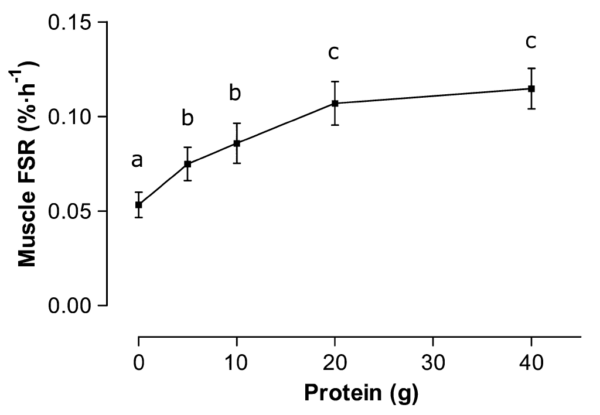
I interviewed Professor Stuart Phillips, the world’s leading researcher in exercise science [39] about this topic since his lab conducted several studies regarding protein intake in athletes (including the study comparing different intakes of egg protein that we just discussed). Dr. Phillips said that James’ statements were based on “weak science.”
“That paper (concluding that 20g egg protein maximized protein synthesis) is over 10 years old. Our sense now is that 0.3-0.4g/kg of HIGH QUALITY protein is needed to maximize MPS in young athletes while elderly may require up to 0.6g/kg per meal.”
Another important thing to remember here is that these researchers said “high quality protein”. All of the studies that I just cited in the previous paragraph (and that James’ cited by default from that paper) used animal proteins. I spoke to both Schoenfeld and Phillips and asked them if they thought that vegan sources of proteins fit the definition of “high quality protein”? They both agreed that they would consider most vegan sources of protein to NOT fit the definition of high quality protein. Phillips said
“on balance, plant based proteins are low quality proteins when ingested in whole food form.”
I also asked Phillips about James’ statement about cooking destroying anti-nutrients in plants. He said
“that is completely untrue that cooking destroys the anti-nutrients in plant proteins, especially with regards to phytates, which don’t go away from cooking.”
Both researchers I spoke with on the phone agreed that in order to achieve the same rates of MPS observed in these studies someone would require significantly more protein from the majority of vegan sources. Phillips said
“it is possible to get enough protein from vegan protein sources to maximize MPS but you would have to either consume isolated proteins like soy, pea, or rice protein, or you would need to eat a massive amount of whole food vegan sources to get the effect as you may need up to two times the amount of protein from vegan sources due to its low leucine content.”
So if we are talking about our 80kg athlete who is trying to get 44g of protein at a meal to maximize MPS, that number could be significantly greater if the only sources of protein are vegan. Even if that number is 50g, only modestly higher, that will require a lot of peanut butter sandwiches and many cups of lentils.
So here we have the two leading researchers in the world on exercise science both saying that James has misrepresented the data on protein intake. Both have also agreed that they would not consider vegan sources of protein to fit the definition of ‘high quality protein’ sources. Therefore, even if James was correct about needing only 20-25g of protein to maximize MPS at a meal, this is only with high quality protein sources that contain sufficient leucine, and both researchers (as well as many others) agree that vegan protein is not high quality. It appears that about ~2g of leucine is needed to trigger MPS and that a cup of lentils only contains 1.3g of leucine. [40] So while it has about 18g of protein, it’s extremely low in the amino acid that is most important for anabolism.
A peanut butter sandwich (including the bread) only contains a paltry 0.5g of leucine, if we are talking about a peanut butter sandwich that contains about 18g of protein like the one James suggested in the film. [41][42] Whereas 3 eggs or 3 oz of steak contain 1.6g of leucine. If you look at a lean source of protein like 3 oz of top sirloin, it is packed with 2.7g of leucine. [44] Let’s just take the peanut butter sandwich out of the discussion, as to get 2g of leucine from peanut butter sandwiches, you’d need to consume 4 of them, packing in over 1600 calories to maximize MPS for JUST ONE FREAKING MEAL. If we examine a cup of lentils, it is still 20% lower in leucine compared to eggs and fatty steak (and half of the leucine content of lean beef). So to maximize MPS at a meal using lentils, you would need a MINIMUM of over 1.2 cups of lentils and a stupid amount of peanut butter sandwiches.
3:08:45 – James talks about optimizing protein for muscle mass and discusses eating around 1.6 g/kg to do so. Once again, James omits the fact that it’s “high quality protein”. I’m not going to disagree with that recommendation, though I think it might be greater, especially based on the data that we just discussed in the previous paragraphs. What I take issue with was that James made it a point to talk about the fact that vegans get nearly the same amount of protein as omnivores ~75g per day. The problem with this is that at low protein intakes, protein quality becomes far MORE important, not less. So I would agree with him that if you eat enough total vegan protein, you can optimize lean body mass, but as we discussed previously, unless you are supplementing with isolated vegan proteins, you are going to need A LOT of intact vegan protein sources to get there. This argument however, is dizzying when juxtaposed with the insinuation that vegans get enough protein because their intake is similar to omnivores.
3:18:45 – Joe says
“he’s shown there’s no evidence you need to eat meat to get protein.”
No, you don’t need to eat meat to get protein if you get enough total protein, I agree with that. But eating meat simply makes it easier. I will point out that from the beginning I never claimed that one couldn’t get enough protein being vegan, just that it’s much more difficult as we discussed in depth. I really feel like Chris let James run all over him because he’s still not forced James to address many of the claims about animal products being blanketly bad for you and missed the chance to jump all over James’ misrepresentations of the protein research.
3:21:03 – James points out that the handbook for becoming a board certified sports nutritionist says
“there is no research to suggest that protein recommendations are different for athletes following a vegetarian diet than for those following an omnivorous diet.” Then he says “see, it doesn’t matter.”
I am not sure if he did it purposefully, but this statement doesn’t mean it doesn’t matter, it just means that there isn’t much research examining it. I’m probably nit picking, but it’s worth noting. Also, it’s another clear appeal to authority logical fallacy.
3:25:41 – While discussing the impact of animal products on endothelial function Chris does a good job citing studies that support the idea that animal products are not necessarily damaging to the endothelium. James starts to say something about endothelial function but Chris cuts him off (finally, he stands up for himself) and says that they weren’t all industry funded. James realizes this tactic won’t work and redirects with pointing out what these studies compare.
“Everything is healthy compared to what?”
He is attempting to say that when they replaced a crappy diet with these animal products they saw improvements. Great point James, I’m so glad you brought it up. In the film there are NUMEROUS instances where you refer to studies examining things like hamburgers versus plant based food and show that the plant based food improved health markers… how is that not EXACTLY the same thing you are now criticizing? Again, James uses and discards logic as it suits his bias. James then shows a study that demonstrates a rise in fat in the blood impairing endothelial function. NO KIDDING JAMES. James then shows another study [time stamp 3:28:39] where they equate calories and compares what James refers to as “animal based versus plant based meals.” Except the authors did not refer to it as plant based meals vs. animal based meals, they called them low fat vs. high fat meals. [45] James PURPOSEFULLY changed the wording from the study to fit his narrative. It’s not just animal products that impair endothelial function, it’s high fat (specifically saturated fat) meals in general. Why do the studies in lean meats not show this same outcome if all meat is bad for us? [46] [47] [48]

brachial artery dilation in healthy subjects 2 h after eating
a test meal. N 20. Low-fat, low-fat meal group: High-fat, high-fat
meal group.
3:32:28 – James doesn’t know a few studies that Chris cites on animal protein and endothelial function so he then hilariously says that Chris can show studies but he would really have to dig into them to know what’s going on and then makes another point about funding (even though he has no idea if the studies were funded by animal industry or not). Another red herring logical fallacy. I found this part hysterical especially since he was absolutely destroying Chris for not having read a few different studies earlier, but when he doesn’t know the studies he acts like Chris is doing the wrong thing by citing them. Bizarre. James senses that he’s losing this portion of the argument so he then goes back to ad hominem attacking Chris saying he’s not fit to evaluate the science rather than addressing the studies that Chris is citing.
“Just because you can show studies that I haven’t read doesn’t mean that I’m wrong (paraphrase).”
Chris actually does a great job in this part of keeping the heat up on James and cites some good research. James resorts to logical fallacies to defend his claims. Ad hominems, appeal to authority, and strawman fallacies all fall within a one minute timeframe.
“The film has been accredited by the defense health agency!”
That is not a shield James and it doesn’t absolve you of all the claims that you failed to adequately defend. Did I mention that James can read a Forest plot?
My thoughts on this debate is that James did a great job on defending preparing for this debate. He made the focus on attacking Chris and discrediting him rather than addressing the claims made by the film. Instead, he attacked Chris’ criticisms about the film. He also absolutely annihilated him on the vitamin B12 claims. I never made claims in my analysis regarding James’ statements on B12 but Chris should have simply admitted he got this wrong rather than continuously trying to defend it.
James also committed an atrocity of logical fallacies and misrepresented key pieces of research to suit his bias. He used logic when it fit and discarded the same logic when it did not fit his agenda. He seemed focussed on destroying Chris rather than defending the film’s claims. He was able to turn it into a debate about the statements that Chris made rather than having to defend statements in the film. He never really addressed the core message of the film or the claims in it other than being able to pick apart some of Chris’ criticisms. As I said from the start of this shit show when I first heard about The Game Changers a few months ago, I have zero doubt that you can be an elite athlete and be vegan. I think you can get enough protein being vegan, albeit more difficult. I think you can be perfectly healthy and be vegan. My problem with the film was the fear mongering with regards to animal products as well as the implications that plant based diets were somehow performance enhancing. I’m ok with a movie promoting plant based diets as an option for athletes. What I’m not ok with is using fear based tactics to scare people into veganism.
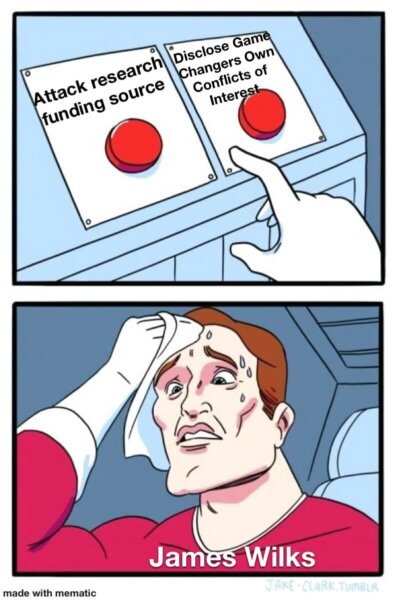
References
- (2014, October 15). Stable Isotope and Trace Element Studies on … – PLOS. Retrieved December 5, 2019, from https://journals.plos.org/plosone/article?id=10.1371/journal.pone.0110489
- (2014, March 24). Comparison of Nutritional Quality of the Vegan … – NCBI – NIH. Retrieved December 5, 2019, from https://www.ncbi.nlm.nih.gov/pmc/articles/PMC3967195/
- (n.d.). Associations of dairy product consumption with mortality in the …. Retrieved December 5, 2019, from https://www.ncbi.nlm.nih.gov/pubmed/31435641
- (2019, January 25). Dairy product consumption and development of cancer … – NCBI. Retrieved December 5, 2019, from https://www.ncbi.nlm.nih.gov/pmc/articles/PMC6352799/
- (2016, October 21). Dairy products intake and cancer mortality risk: a … – NCBI – NIH. Retrieved December 5, 2019, from https://www.ncbi.nlm.nih.gov/pmc/articles/PMC5073921/
- (n.d.). Dietary Fat, Fatty Acids and Risk of Prostate Cancer in … – NCBI. Retrieved December 5, 2019, from https://www.ncbi.nlm.nih.gov/pmc/articles/PMC4129658/
- (2011, July 21). Reported behavior of eating anything at anytime and risk of …. Retrieved December 5, 2019, from https://www.ncbi.nlm.nih.gov/pubmed/21520042
- (2019, May 1). Milk and Dairy Product Consumption and Inflammatory … – NCBI. Retrieved December 6, 2019, from https://www.ncbi.nlm.nih.gov/pubmed/31089732
- (n.d.). Lean meat and heart health. – NCBI. Retrieved December 26, 2019, from https://www.ncbi.nlm.nih.gov/pubmed/15927927
- “Dietary intake of heme iron and risk of cardiovascular disease ….” 30 Sep. 2014, https://www.ncbi.nlm.nih.gov/pubmed/25439662. Accessed 7 Dec. 2019.
- “The Antioxidant Effect of Exercise: A Systematic … – NCBI.” https://www.ncbi.nlm.nih.gov/pubmed/27260682. Accessed 7 Dec. 2019.
- Acute Exercise Increases Plasma Total Antioxidant … – NCBI.” 9 Mar. 2011, https://www.ncbi.nlm.nih.gov/pmc/articles/PMC3062968/. Accessed 7 Dec. 2019.
- “The Antioxidant Effect of Exercise: A Systematic … – NCBI.” https://www.ncbi.nlm.nih.gov/pubmed/27260682. Accessed 7 Dec. 2019.
- (2019, November 19). Red Meat Intake and Cancer Mortality and Incidence | Annals …. Retrieved December 27, 2019, from https://annals.org/aim/fullarticle/2752321/reduction-red-processed-meat-intake-cancer-mortality-incidence-systematic-review
- “The Science Of Sugar And Fat Loss | Bodybuilding.com.” 12 Mar. 2019, https://www.bodybuilding.com/content/the-science-of-sugar-and-fat-loss.html. Accessed 9 Dec. 2019.
- (2012, August 6). The effects of four hypocaloric diets containing different levels …. Retrieved December 9, 2019, from https://nutritionj.biomedcentral.com/articles/10.1186/1475-2891-11-55
- (n.d.). Reduced glycemic index and glycemic load diets do not …. Retrieved December 9, 2019, from https://www.ncbi.nlm.nih.gov/pubmed/16177201
- (2000, October 4). Randomized controlled trial of changes in dietary … – Nature. Retrieved December 9, 2019, from https://www.nature.com/articles/0801451
- (n.d.). Weight loss in overweight subjects following low-sucrose or …. Retrieved December 9, 2019, from https://www.ncbi.nlm.nih.gov/pubmed/11477496
- (n.d.). Metabolic and behavioral effects of a high-sucrose diet during …. Retrieved December 9, 2019, from https://www.ncbi.nlm.nih.gov/pubmed/9094871
- (n.d.). NutriRECS. Retrieved December 27, 2019, from https://nutrirecs.com/
- (2019, October 14). Research group that discounted risks of red meat has ties to …. Retrieved December 27, 2019, from https://www.washingtonpost.com/business/2019/10/14/research-group-that-discounted-risks-red-meat-has-ties-program-partly-backed-by-beef-industry/
- (2018, December 14). James Cameron Participates in $140 Million Vegan Protein …. Retrieved December 27, 2019, from https://www.livekindly.co/filmmaker-james-cameron-vegan-pea-protein-investment-ingredion/
- (2019, November 17). Is Game Changers Funded by Impossible Foods or Beyond …. Retrieved December 27, 2019, from https://medium.com/@lancengym/is-game-changers-funded-by-impossible-foods-or-beyond-meat-d9f323133350
- (2019, November 11). The Game Changers Review – A Scientific Analysis – Biolayne. Retrieved December 9, 2019, from https://www.biolayne.com/articles/research/the-game-changers-review-a-scientific-analysis/
- (2016, February 9). Consumption of a high-fat meal containing cheese … – NCBI. Retrieved December 9, 2019, from https://www.ncbi.nlm.nih.gov/pmc/articles/PMC4791521/
- (2015, September 19). Peanuts as functional food: a review – NCBI. Retrieved December 9, 2019, from https://www.ncbi.nlm.nih.gov/pmc/articles/PMC4711439/
- (n.d.). Protein – Which is Best? – NCBI. Retrieved December 9, 2019, from https://www.ncbi.nlm.nih.gov/pmc/articles/PMC3905294/
- (2009, April 29). The leucine content of a complete meal directs peak activation …. Retrieved December 9, 2019, from https://www.ncbi.nlm.nih.gov/pubmed/19403715
- (2016, March 23). Protein Considerations for Optimising Skeletal Muscle … – NCBI. Retrieved December 9, 2019, from https://www.ncbi.nlm.nih.gov/pmc/articles/PMC4848650/
- (2018, July 24). Soy protein supplementation is not androgenic or … – NCBI. Retrieved December 27, 2019, from https://www.ncbi.nlm.nih.gov/pmc/articles/PMC6057888/
- (2018, February 27). How much protein can the body use in a single meal for …. Retrieved December 12, 2019, from https://www.ncbi.nlm.nih.gov/pmc/articles/PMC5828430/
- (n.d.). Resistance Training: Worldwide – Expertscape.com. Retrieved December 27, 2019, from http://expertscape.com/ex/resistance+training
- (n.d.). The response of muscle protein synthesis following whole …. Retrieved December 12, 2019, from https://www.ncbi.nlm.nih.gov/pubmed/27511985
- (2008, December 3). Ingested protein dose response of muscle and albumin … – NCBI. Retrieved December 12, 2019, from https://www.ncbi.nlm.nih.gov/pubmed/19056590
- (2013, March 4). Timing and distribution of protein ingestion during prolonged …. Retrieved December 12, 2019, from https://www.ncbi.nlm.nih.gov/pubmed/23459753
- (2019, February 1). Dose-Dependent Increases in Whole-Body Net Protein … – NCBI. Retrieved December 12, 2019, from https://www.ncbi.nlm.nih.gov/pubmed/30722014
- (2008, December 3). Ingested protein dose response of muscle and albumin … – NCBI. Retrieved December 12, 2019, from https://www.ncbi.nlm.nih.gov/pubmed/19056590
- (n.d.). Resistance Training: Worldwide – Expertscape.com. Retrieved December 27, 2019, from http://expertscape.com/ex/resistance+training
- (2019, November 27). Top 10 Foods Highest in Leucine – My Food Data. Retrieved December 27, 2019, from https://www.myfooddata.com/articles/high-leucine-foods.php
- (n.d.). Amount of Leucine (Leu or L) α-amino acid in Peanut butter …. Retrieved December 27, 2019, from https://www.traditionaloven.com/foods/specific-nutrient/legume/peanut-butter-smooth-style-unsalted/leucine-leu-l-alpha-amino-acid.html
- (n.d.). Amount of Leucine (Leu or L) α-amino acid in Bread, whole …. Retrieved December 27, 2019, from https://www.traditionaloven.com/foods/specific-nutrient/baked-item/bread-whole-wheat-commercial-toasted/leucine-leu-l-alpha-amino-acid.html
- (2019, November 27). Top 10 Foods Highest in Leucine – My Food Data. Retrieved December 27, 2019, from https://www.myfooddata.com/articles/high-leucine-foods.php
- (n.d.). Leucine in ‘Beef, loin top sirloin’ to ‘Beef, loin top sirloin’ Foods. Retrieved December 27, 2019, from http://www.dietandfitnesstoday.com/foods-high-in-vitamin.php?offset=50&nutid=504
- (n.d.). Postprandial hypertriglyceridemia impairs endothelial function …. Retrieved December 27, 2019, from https://www.ncbi.nlm.nih.gov/pubmed/11254924
- (2014, June 19). Effects of a DASH-like diet containing lean beef … – NCBI – NIH. Retrieved December 9, 2019, from https://www.ncbi.nlm.nih.gov/pmc/articles/PMC4160562/
- (n.d.). The Mediterranean Diet and Cardiovascular Health. – NCBI. Retrieved December 9, 2019, from https://www.ncbi.nlm.nih.gov/pubmed/30817261
- (2016, October 17). Isocaloric Diets High in Animal or Plant Protein Reduce Liver …. Retrieved December 9, 2019, from https://www.ncbi.nlm.nih.gov/pubmed/27765690
